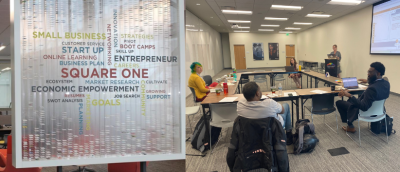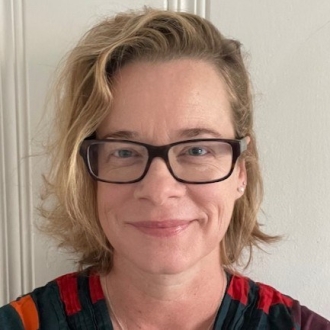Know Your Value: Data-Driven Community Support By Your Library, For Your Library

Written by Jenny Garmon, Consultant and Fellow, Urban Libraries Council
How many times have you, in the library world, heard a patron exclaim, “I didn’t know the library did that!” I know it was simultaneously a thrill and a motivator to hear, because I felt it too: I was excited to be the one introducing patrons to a library service, and I was intrigued by the consistent need to market our services and reach our community in more effective and innovative ways.
With that in mind, I’ve enjoyed the opportunity to explore Strengthening Libraries as Entrepreneurial Hubs with the Urban Libraries Council (ULC). During this project, we aimed to gain a deeper understanding of the collective impact and power of libraries within local entrepreneurial ecosystems. Library staff support entrepreneurs with one-on-one meetings, focused collections, partnerships, community gatherings, and access to makerspaces. We launched a Kansas City-based pilot project in April 2024, focusing on our goal to strengthen libraries' connections with and empowerment of entrepreneurs, and center their work within the regional entrepreneurial ecosystem.
In the Kansas City area, we have three library systems—Johnson County Public Library, Kansas City Public Library, and Mid-Continent Public Library—that are connected through their ULC membership, their geographic proximity, and their reciprocal agreements, including cross-catalog searching and account linking. This provided a unique opportunity for collaboration in many facets of library service.
A key feature of this Entrepreneurship work was ULC’s recently updated Business Value Calculator, a resource that helps public libraries quantify the economic impact of their support to entrepreneurs and small business owners in their communities. By inputting data in key areas such as training and education, research services, physical space, and access to technology and equipment, libraries can generate a customized report that quantifies their impact. This report can then be used to engage stakeholders and advocate for continued or increased funding.

In Kansas City, we utilized a comprehensive set of resources to enhance our understanding and strengthen our libraries. We started with the Swarthmore College Lang Center for Civic and Social Responsibility’s Social Business Model Canvases, iteratively used ULC’s Business Value Calculator (BVC), and collaborated on a collective asset map that was a real joy to create. We learned a great deal about each other, and we gained some valuable lessons that we want to share with you to help you put this toolkit to work for your library.
1. Leverage Regional Partnerships
Geographically close library systems can be excellent partners for one another and for their communities. When we collaborate, our systems and communities benefit from our shared understanding of our strengths and resources, including staff, collections, and more. This regional approach could create the right environment for collectively hosting events and applying for grants.
2. Identify Your Library’s Unique Strengths
Understanding our library’s strengths and how we can work with other libraries in our area to support patrons is powerful. Not every library has a Makerspace, not every library has a dedicated staff member for small business or nonprofit support, but the depth and breadth of our in-person and digital collections, our collective assets, and our connections to our local entrepreneur ecosystem provide exceptional support to our community.
3. Calculate Your Community’s ROI
The BVC helps libraries communicate the return on investment of their community with accountability and transparency. Because we are measuring our impact, we improve our impact. Because we are sharing our impact in turn, our patrons and local entrepreneurial ecosystem can respond.
4. Get Buy-In From Library Leadership
Library leaders play a key role in the successful use of the Business Value Calculator. Their sponsorship of the BVC effort and their support for the project ensure that the library staff who possess the necessary information for the calculator are aware of their pivotal roles. Conversely, the library leader is aware of the origin of the data. Library leaders set the tone for the teamwork required to initiate and complete the BVC, as well as for effective communication with their staff, the library board, and library patrons and partners.
Public libraries have long been pillars of opportunity, learning, and innovation—but when we position them as entrepreneurial hubs, their value to the community grows even more tangible. Through collaboration, resource sharing, and tools like ULC’s Business Value Calculator, libraries can not only support local entrepreneurs more effectively but also demonstrate their measurable impact with clarity and confidence. Our work in Kansas City shows that when libraries work together regionally, recognize their unique strengths, and have strong leadership backing, they can create a powerful, sustainable role within their local entrepreneurial ecosystem.

Jenny Garmon
Consultant and Fellow, Urban Libraries Council
Jenny Garmon, an independent consultant based in Kansas City, was the first civic engagement specialist for the Kansas City Public Library. She is a graduate of the University of Connecticut as well as Ohio State University, where she earned her M.A. in public policy and management, and Emporia State University, where she earned her master’s in library science. In addition to her military service, Jenny is a former federal employee recognized for her award-winning work with teams as an analyst, branch chief, and adviser. Her primary areas of focus for the library were coordinating media literacy and news literacy resources and events, hosting relevant community conversations, connecting Kansas Citians with civic tools, coordinating tax preparation information and leading notary services, as well as promoting voter education and registration. Jenny also worked with Kansas City’s legal and government communities to connect patrons with information and resources.
